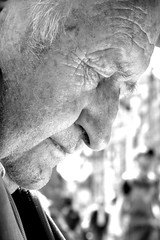 |
| Image ©Vince Garcia |
At Christmas, differences between ourselves and our
elderly relatives can be shoved into garish spotlight – our backgrounds; our
upbringings; our educations; our politics and social outlooks; our attitudes
towards religion, ‘authority’, life and death, money, health, gender issues,
race, tradition, relationships; and so on. Note that one difference I have not
mentioned in the list is age; I have not mentioned it, because it is not, per se, a relevant difference.
Enlightened views clash with entrenched prejudices. Modern
flexibility slumps uncomfortably in its dining-chair beside stiff-backed
‘Victorian values’ of ‘work ethic’, ‘sense of duty’, belief in all-powerful
deity, distrust of things ‘foreign’. Bitten tongue and knotted stomach conspire
to block the passage of dry turkey, until copious wine comes to the rescue.
Aging is a wonderful thing. A life spent learning, open to
new experiences, experimenting, thinking, laughing, loving, and caring will
create a vibrant mind of untold complexity. The problem with it – as we are all
too aware – is that it tears at the mind and body. As the brain falls prey to
structure-wrecking illness, such as Alzheimer’s, the mind begins to wander and
fade. Impoverished by the ailing body, sensory input to the brain stutters. And
when that happens, we the cognitively intact must confront the threadbare
consciousnesses of our ailing relatives. To a large extent, what remains is
governed by what went before; a flexible, optimistic mind may well outlast an
entrenched one. Neurons well ‘attuned’ to making new connections may find ways
to circumvent some of the damage as it progresses. The mental macrocosm
inhabited by the sufferer will certainly shrink, so it pays to have a lot of
cognitive ‘reality estate’ to spare.
So to the thought experiment: What if the capabilities of
the brain and body were not looted by aging? What new, lucent complexity
would those time-honed minds begin to exhibit? As we have no experience of such
persons, this is difficult to answer. Nevertheless, it may be easier to imagine
loving, vibrant elderly people developing into super-wise ancients than to
imagine the curmudgeons doing so. Stuck in the past and embittered by long-held
prejudices, the curmudgeon’s limited macrocosm has reduced to a dot. But what
if we had time to shore it up, stretch out its walls, and fill it with
enlightened wonder?
Some of us are slow starters. For some, enlightenment
takes only time; for others, it takes therapy, drugs, or neurosurgery. In a
world without aging, very long-lived individuals would be expected to play a
full part in society; ‘old age’ would no longer be an excuse for fixed,
discriminatory attitudes. Though some brains may be ‘wired’ for prejudice and
dysphoria, society would need to find humane ways to mitigate this. However, I
think that the chance to begin again as rejuvenated, valued citizens would, in
most cases, be enough to bring about epiphany.
If we find ourselves struggling with our elderly relatives
this Christmas, we could perhaps try to bear this in mind. When tempers fray
and boundaries are crossed, when stereotyping rears its ugly head, when disdain
sours the fragrant atmosphere, when nothing we do is thought well of; we could
try to bear in mind not what they once were, but what they could – given
a new chance at life and a heady draught of wonder – become.
1 comment:
Lovely blog I feel very amused by reading this blog. alejandro betancourt
Post a Comment